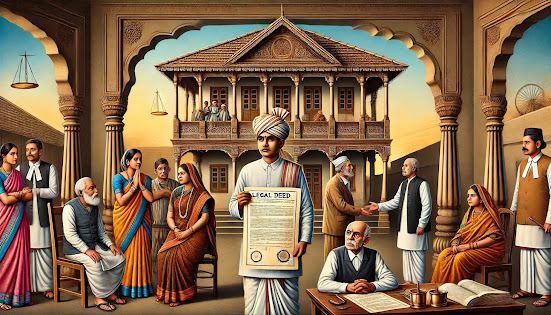In many families, ancestral property is
considered a source of pride and protection from future calamities, but when it
comes to its sale, division or transfers it becomes a subject of dispute.
In this blog, we will explore the key legal
aspects that determine whether a father has the right to sell Ancestral Property
without consulting his Legal Heirs, and what rights his legal heirs have in
this Ancestral Property.
Therefore, the question often arises
whether a father can sell the Ancestral Property without consulting his legal
heirs or obtaining their consent?
Before knowing the solution of the question, can father sell Ancestral
Property without the consent of his family members or not, we need to know
which property is called Ancestral Property.
What is an Ancestral property?
The
following properties are treated as ancestral property:
➣A
property which is acquired by a great grandfather and passed down undivided to
the next three generations up to the present generation of great
grandson/granddaughter.
➣Legally,
an Ancestral property is the one which is inherited up to four generations of
male lineage without dividing and partitioning the property by the previous
three generations.
➣An
ancestral property must be undivided by the family members.
➣A
person has his right over the ancestral property by birth.
➣The
properties acquired from mother, grandmother, uncle or brothers are not
considered as ancestral property.
➣Properties
inherited by WILL and Gift are not Ancestral Property.
Now
after going through the definitions of ancestral property, we will know that,
whether the father having his right to sell an ancestral property without the
consent of the family members or not, or if he has the right to sell then under
what circumstance he can sold an ancestral property without taking any consent
of his son, daughter and other family members.
Can
father sell ancestral property?
It
is proved from the above discussion that, a person cannot transfer an Ancestral
property by way of a WILL or gift deed as per his own choice and without taking
the consent of other members of the family, hence an Ancestral property cannot
be sold without the consent of successors in case of major and in case of
minor, permission of the Court is mandatory, and finally the father cannot sell
the property to anyone, and even if he sold an ancestral property then it can
be reclaimed by his legal heirs.
Can
Karta of Hindu Undivided Family sell the ancestral property?
The
head of a Hindu undivided family (HUF) has power to manage the family assets
under the Hindu Law, but he has not full right over the Ancestral property, and
each coparcener is entitled for getting his /her share, title, right, and
interest in the ancestral property.
However,
there are certain circumstances under which a Hindu father being the Karta of
HUF sells the ancestral property without taking the consent of coparcener.
Circumstances under which
a father can sell an ancestral property:
➤For the
payment of government revenue and of debts which are payable out of the family
property
➤For the
maintenance of coparceners and of the members of their families
➤For the
marriage expenses of male coparceners, and of the daughters of coparceners
➤For the
performance of the necessary funeral or family ceremonies
➤For the
costs of necessary litigation in recovering or preserving the estate
➤For the
costs of defending the head of the joint family or any other member against a
serious criminal charge
➤For the
payment of debts incurred for family business or other necessary purpose.
Hence, the father can
sell or mortgage ancestral property, including the shares of his sons,
grandsons and great-grandsons in the property for a valid reasons only,
otherwise he cannot sell an Ancestral property without getting the consent of
the successor of the property, and if he sold the ancestral property without
any valid reason or without the consent of the successors , then the successor
can claim his right in the property after filing a suit before the Court of
law.
For Muslim and Christians, there is no concept of ancestral property. The property can be given to one son as per the limit permitted under personal law for Muslims.
Conclusion
In short, a father cannot sell Ancestral Property
without the consent of the Legal Heirs unless the property is legally divided
or he has sole ownership over it.
In a situation where the property is still
Ancestral, the consent of all legal heirs is mandatory in the decision to sell.
If the sale is done without their consent, they have the right to challenge it
in Court.
Reply to your questions:
Who
has right on ancestral property?
All
the family members have right on ancestral property, including sons and
daughters. Now after the amendment in 2005 in the Hindu Succession Act, 1956, a
daughter whether married or unmarried has equal right same as son , and before
2005, only sons were having share in the ancestral property.
Is
the property gifted by my father an ancestral property?
No, the property received by way of gift from your father is a self acquired property and not an ancestral property.


Post a Comment